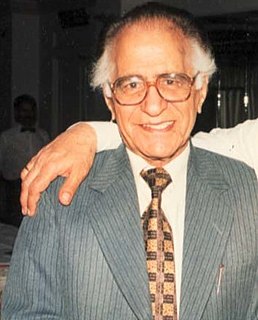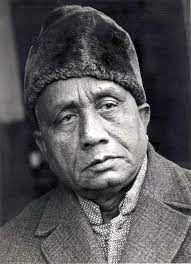
Faiz Ahmad Faiz was a Pakistani poet, and author in Urdu and Punjabi language. He was one of the most celebrated writers of the Urdu language in Pakistan. Outside literature, he has been described as "a man of wide experience" having been a teacher, an army officer, a journalist, a trade unionist and a broadcaster.

Altaf Hussain Hali, also known as Maulana Khawaja Hali, was an Urdu poet and a writer.
Urdu literature is literature in the Urdu language. While it tends to be dominated by poetry, especially the verse forms of the ghazal غزل and nazm نظم, it has expanded into other styles of writing, including that of the short story, or afsana افسانہ. Urdu literature is mostly popular in Pakistan, where Urdu is the national language and India, where it is a recognized language. It is also widely understood in Afghanistan and has moderate amount of popularity in Bangladesh.

Ahmad Nadeem Qasmi born Ahmad Shah Awan was an Urdu language Pakistani poet, journalist, literary critic, dramatist and short story author. He wrote 50 books on topics such as poetry, fiction, criticism, journalism and art, and was a major figure in contemporary Urdu literature. His poetry was distinguished by its humanism, and his Urdu afsana work is considered by some second only to Munshi Prem Chand in its depiction of rural culture. He was also editor and publisher of the literary magazine Funoon for almost half a century. He received awards such as the Pride of Performance in 1968 and Sitara-e-Imtiaz in 1980 for his literary work.
Yasmeen Hameed is a Pakistani Urdu poet, translator and an educator.

Naʽat is poetry in praise of the Islamic prophet, Muhammad. The practice is popular in South Asia, commonly in Bengali, Punjabi or Urdu. People who recite Naʽat are known as Naʽat Khawan or sanaʽa-khuaʽan. Exclusive "Praise to Allah" and Allah alone is called Hamd, not to be confused with 'Na'at'.
Shan-ul-Haq Haqqee, Sitara-e-Imtiaz, Tamgha-e-Quaid-i-Azam, was a notable Urdu poet, writer, journalist, broadcaster, translator, critic, researcher, linguist and lexicographer of Pakistan.

Ehsan Danish, born Ehsan-ul-HaqEḥsānu l-Ḥaq), was an Urdu poet, prose writer, linguist, lexicographer and scholar from Pakistan. Ehsan Danish had penned down over 100 scholastic books on poetry, prose, linguistics, lexicography and prosody. At the beginning of his career his poetry was very romantic but later he wrote his poems more for the labourers and came to be called "Šhāʿir-e Mazdūr" by his audience. According to one commentator, his poetry inspired the common people's feelings and he has been compared with Josh Malihabadi. He holds the unique position as one of the best poets of all times, with fine, romantic and revolutionary, but simple style of poetry.

Jagan Nath Azad, was an Indian Urdu poet, writer and academician. He wrote over 70 books, including poetry collections, poems, biographies, and travelogues.
Professor Muhammad Ilyas (Elias) Burney (1890–1959) was the first head of Department of Economics at Osmania University, Hyderabad, India. He published about 40 books in Urdu, Persian, Arabic and English. He wrote the first book about Economics in Urdu, for which Sir Muhammad Iqbal complimented him in 1917. His other books in economics included Ilm ul Maaeshat, Muqaddima e Maashiyat and Indian Economics.
Waheed Qureshi was a Pakistani noted linguist, literary critic, writer, researcher, educationalist and scholar of Urdu literature and oriental languages. Waheed Qureshi was one of the foremost scholars who helped shape the mood and colour of research on oriental languages and literature.

Shamim Hashimi born Syed Muhammad Shamimuddin on 14 August 1947, is an Urdu and Persian poet. He is basically a poet of Ghazal. He has also written poems of other forms of poetry in different meters.

Ada Jafarey, often spelled Ada Jafri, was a Pakistani poet who is regarded as the first major female Urdu poet to be published and has been called "The First Lady of Urdu Poetry". She was also an author and was considered a prominent figure in contemporary Urdu literature. She received awards from the Government of Pakistan, the Pakistan Writers' Guild, and literary societies of North America and Europe in recognition of her efforts.
Maulana Naeem Siddiqui was a Pakistani Islamic scholar, writer and politician. He was among the founder-members of the Jamaat-e-Islami and a close associate of Abul A'la Maududi and Amin Ahsan Islahi.
Ale Ahmad Suroor (1911-2002) was an Urdu poet, critic and professor from India. He is best known for his literary criticism. In 1974 he was honoured with the Sahitya Akademi Award by the Government of India for his literary critic work, Nazar aur Nazariya. In 1991 he was also awarded the Padma Bhushan, India's third highest civilian award. He was awarded a special gold medal by the President of Pakistan on the centenary of the birth of Muhammad Iqbal.
Zafar Iqbal is an Urdu poet based in Okara, Punjab, Pakistan.

Dr Syed Aijazuddin Shah is an Urdu and Hindi humorist, satirist and poet. He performed in Mushaira and Kavi Sammelan for over 45 years all over the world.
Abdur Rauf Urooj was a Pakistani poet, critic, journalist, and research scholar. Besides writing poetry, he also composed songs, including his first song titled "Phir aaj Divali aai" which was recorded by Deccan Radio. He also composed music for Radio Pakistan.









